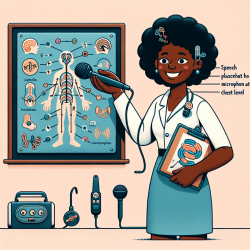Introduction
As professionals dedicated to the development and well-being of children, it is crucial to leverage research findings to enhance our practice. The study titled "Improving Physical Fitness and Cognitive Functions in Middle School Students: Study Protocol for the Chinese Childhood Health, Activity and Motor Performance Study (Chinese CHAMPS)" offers valuable insights into the role of physical activity in improving both physical fitness and cognitive functions in middle school students. This blog post aims to explore how practitioners can implement these findings to improve outcomes for children.
Understanding the Chinese CHAMPS Study
The Chinese CHAMPS study was a cluster randomized controlled trial conducted across 12 middle schools in three Chinese cities. The study aimed to modify school physical activity policies and curricula to enhance physical activity and healthy eating among students. The intervention involved increasing the amount and intensity of physical activity through both school physical education (PE) and after-school programs, while also engaging parents to support these initiatives.
Key Findings and Implications for Practitioners
The study's findings underscore the significant impact of increased physical activity on both physical fitness and cognitive functions. Here are some key takeaways for practitioners:
- Enhanced Physical Fitness: The study demonstrated that increased moderate to vigorous physical activity (MVPA) led to improved cardiorespiratory fitness, reduced body fat percentage, and better overall physical fitness among students.
- Improved Cognitive Functions: Regular participation in physical activity was associated with better cognitive outcomes, including fluid intelligence, attention control, and executive function.
- Multi-Level Interventions: The study highlighted the importance of multi-level interventions that involve policy changes, curriculum modifications, teacher training, and parental engagement to create a supportive environment for physical activity.
Implementing Research Findings in Practice
Practitioners can draw on these findings to enhance their practice and create better outcomes for children:
- Advocate for Policy Changes: Encourage schools to adopt policies that increase opportunities for physical activity, such as extending PE classes and incorporating active recess periods.
- Curriculum Modifications: Work with educators to design PE curricula that are engaging, developmentally appropriate, and aligned with national standards to maximize student participation and enjoyment.
- Teacher Training: Support professional development for PE teachers to equip them with the skills and knowledge needed to deliver high-quality, effective physical education programs.
- Parental Engagement: Involve parents in promoting healthy habits at home through communication campaigns and resources that emphasize the importance of physical activity and healthy eating.
Encouraging Further Research
While the Chinese CHAMPS study provides valuable insights, there is always room for further research. Practitioners are encouraged to explore additional studies that examine the long-term effects of physical activity on cognitive and physical development in children. By staying informed and engaged with the latest research, practitioners can continue to refine their approaches and improve outcomes for the children they serve.
To read the original research paper, please follow this link: Improving Physical Fitness and Cognitive Functions in Middle School Students: Study Protocol for the Chinese Childhood Health, Activity and Motor Performance Study (Chinese CHAMPS).










